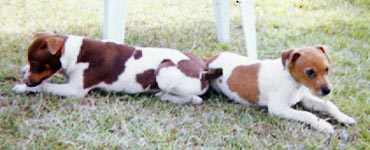Visual Identification of your dog's color genes
This section is written
for the sole purpose of helping those that are interested in learning how
to identify what color genes your dog is definitely carrying. It is most
useful to breeders who are attempting to breed for specific colors.
For example purposes we have listed only a few gene combinations that can
be produced from a mating.
.

(atb) Chocolate
(ayB) Tan |

(at) Black & Tan |
.
By looking at
your dog you will be able to identify some of the genes that he is carrying.
(A
Series) genes: If your dog is black and white, blue and white,
chocolate or red and white (with a chocolate or red nose), lemon and white,
or Weimaraner Gray/Pearl, without any tan markings or solid in any of these
colors, he carries the (A) gene. If your dog is tan
and white, redtan and white, fawn and white, without tan point markings,
or solid of these colors, your dog carries the (ay) gene. When he
carries only the (at) gene your dog's color will be black and tan,
or Tri (example black, white and tan) in any color. A dog that has the
(at) gene in double dose always has tan markings. If your dog is sable,
tan with black hairs running down its back or around its face and
head, it carries the (ayat) gene.
(B Series):
If your dog has a black nose, regardless
of its color, he carries the (B) gene. If
it is chocolate or red in color
with a chocolate nose it carries the (b) gene.
(C Series):
When your dog's color stays relatively
constant through out life he carries the
(C) gene. The (Cch) gene considerably
lightens the color of tans and
yellows to a crème or almost white
color starting soon after birth.
(D Series):
If your dog is black, white, red, tan,
sable, fawn, chocolate, with or without white or tan markings, your dog
carries the (D) gene. If your dog is blue, silver, apricot, lemon,
crème or charcoal, with or without white or tan markings he has
the (d) gene and the coat always has the appearance of being flat
or dull in color.
(E Series):
If your dog has a black mask he carries
the (Em) gene. Dogs that are blacks, blues, tans, chocolates, silver,
or white, with or without white or tan markings carry the (E) gene.
A dog that carries the (ebr) gene is Brindle (Tiger striped pattern).
If your dog is lemon or clear red with a black nose it carries the (e)
gene. You will not see any black hairs on the dog's coat.
 (Em) Black Mask
(Em) Black Mask
|
 (ebr) Brindle
(ebr) Brindle
|
(S Series):
If your dog is solid or black and tan,
or Bi in any color (without any white color) on the coat he carries the
(S)
gene. When white markings only appear in any or all of the following
areas: chest, collar, blaze, boots or toes and tip of tail, the dog carries
the (si) gene. The (si) gene does not appear as patches of white.
The (sp) gene produces patches of color or blankets of color on
the dog's coat. A dog with the (sw) gene will be solid white or
may have color only on its head or base of tail. Examples of (si) and (sp)
dogs shown on next page.
 (si) Irish Spotting White
(si) Irish Spotting White
|
 (sp) Piebald White
(sp) Piebald White
|
(T Series):
A dog that has "freckles" on its coat
or skin carries the (T) gene
called Ticking. They may not appear
at birth but slowly start to
appear as the dog gets older. There can
be a large amount almost
covering the dog or very little appearing
only in certain areas. A
dog that does not have ticking carries
the (t) gene. |
(T) Ticking
|
PREVIOUS PAGE
NEXT PAGE







